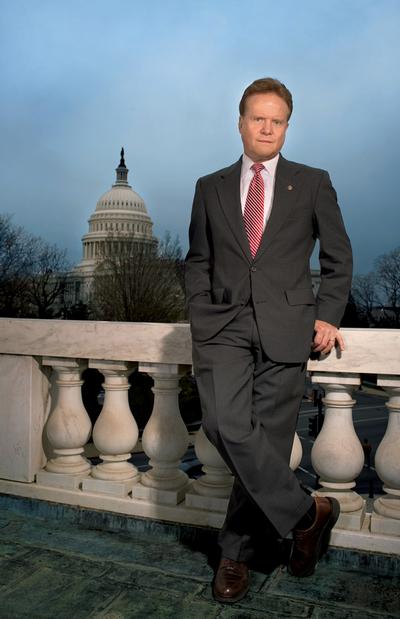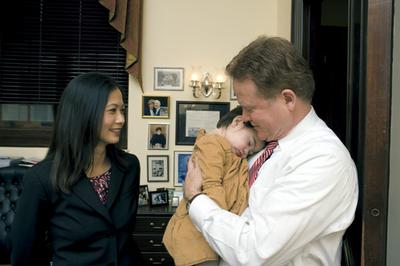
On a sunny spring afternoon, Jim Webb’s public and private lives came together at the White House. Webb had been invited to a policy briefing with President Bush, Dick Cheney, Condi Rice, and their top aides. The topics on the Cabinet Room’s polished mahogany table would be Iraq and terrorism.
Webb had his own agenda.
Alone among a dozen senators and representatives entering the West Wing that day, Virginia’s junior senator arrived with a military escort. The Marine lance corporal at his side, in dress blues, was Jimmy Webb, his only son, just back from combat in Iraq’s Anbar province.
Months earlier, at a November 2006 reception for newly elected lawmakers, Webb had blown off Bush when the President tried to strike up a conversation about Jimmy. “How’s your boy?” Bush had asked. None of your business, said Webb, and by the way, how about getting our troops out of Iraq?
The Bush/Webb face-off reverberated along red and blue fault lines and grew in the retelling. Netroots liberals, instrumental in Webb’s election, cheered their hero and the notion that he’d been on the verge of slugging the President. Conservative columnist George Will condemned Webb as an insufferable boor.
Webb would spend the next year, in ways large and small, getting beyond that White House exchange. Along the way, he grew into the job and crafted his own narrative, a more complicated story than the one about a combative Democrat who stood up to—or insulted—the President.
He redefined himself as a serious public figure while becoming more of a politician than people expected. He also showed flexibility and a willingness to fix problems, including the way he had burst into the nation’s consciousness.
When the invitation came for a foreign-policy discussion at the White House on June 13—the one-year anniversary of his victory in the Virginia primary—Webb saw an opportunity to repair the damage from his 2006 encounter with Bush.
“Why don’t we just put this whole thing to bed?” he told David Broome, the administration’s lobbyist in the Senate and a longtime acquaintance. “Bush asked how my son is. I’d like him to meet my son.”
Webb had been steamed when the tale of his tiff with Bush wound up on the front page of the Washington Post. He saw it as a Republican effort to define him in negative terms and limit his effectiveness before he could get his feet on the ground in the Senate.
Now, as Broome made arrangements for the Webbs to be ushered into the Oval Office and get their pictures taken with the President, Webb told the lobbyist, “I don’t want any press on it. I just want to show him there’s no hard feelings here.”
Once again, the story got out, but this time it was on Webb’s terms: The new senator who had snubbed the President had made amends.
As a writer, Webb could take years to digest an idea. His last nonfiction book, Born Fighting, a history of the Scots-Irish and his own forebears, took “30 years of thinking,” he says. The Emperor’s General, his fictional account of the post–World War II occupation of Japan under General Douglas MacArthur, was preceded, he says, by ten years of thinking.
But as a senator, he’s quickly found his voice. He credits that to his experience in Ronald Reagan’s Pentagon and as a legislative counsel on the House side in the late ’70s. With supreme self-confidence, Webb says there weren’t any surprises in his new job as senator, the first elective post he’s held, because he knew what he was getting into. He didn’t bother asking his new colleagues for advice before he was sworn in.

“I know how to make decisions,” he says, “and I know how to lead.”
His Democratic colleagues have been surprised that the voice they’ve been hearing is that of a team player. Notwithstanding Webb’s reputation for independence and his background as a Republican appointee, he voted with Bush less often than the average Democratic senator, according to an analysis by Congressional Quarterly in September.
Yes, he could be headstrong. When Harry Reid, the new majority leader, phoned to tell Webb he’d be on the Banking committee, Webb asked for Foreign Relations instead. Reid, who’d just spent two days juggling committee slots, said okay.
After party leaders gambled on the new senator for their response to Bush’s 2007 State of the Union address, Webb threw out the text written by Reid’s staff, substituted his own, and was rewarded with rave reviews. His “commanding” performance, as the New York Times saw it, underscored the value of having a decorated Marine combat veteran carrying the Democratic spear against Bush’s war.
Following some early stumbles, Webb largely managed to sidestep controversy. He built respect by playing an influential role—exceedingly rare for a freshman—in Washington’s foreign-policy debate. And he used the capital he gained wisely, though he’ll never be someone Democrats can take for granted.
“He’s smart. He’s obviously well briefed. He picks and chooses his spots,” says a Democratic leadership aide. “You can make jokes about his willingness for confrontation, but I think he’s also demonstrated an ability to work across the aisle.”
Webb led Democrats to the high-water mark of their ultimately futile effort in 2007 to reverse US policy in Iraq. His “dwell time” amendment, a requirement that US forces spend as much time at home as they do overseas, would have had the effect of forcing a drawdown of combat forces. It attracted bipartisan support, including from Virginia colleague John Warner, and fell four votes short of beating a Republican filibuster in July.
Webb pressed for more Republican votes; by mid-September he seemed to be making progress. Then Warner delivered a welcome-to-the-major-leagues surprise. Warner, who, like Webb, had served in the Marines and as Navy secretary, reversed his position on the Webb amendment after being lobbied by the White House and Pentagon. With virtually no warning, Warner declared his opposition on the Senate floor, a gut punch that stunned Webb. In a sign of maturity as a lawmaker, Webb kept his feelings to himself, expressing “great respect” afterward for the man who had torpedoed his plan.
Warner was among many old Washington hands who’d had their doubts about Webb. The freshman’s reputation for combativeness had preceded him, and the Senate has seen its share of flamethrowers. “I wasn’t entirely sure, even though I’d known him through the years, just how he would work,” Warner said after announcing his retirement, which will make Webb Virginia’s senior senator at year’s end.
At 62 this month, Jim Webb has successfully launched his new career as a politician, with ambitions that may not be confined to the Capitol. The acknowledged star of a large class of Senate newcomers finds himself in the mix for the vice presidency on this year’s Democratic ticket.
A loner all his life, he’ll never be a backslapper. Nor will anyone confuse him with a pothole senator. Webb’s interest in pursuing big ideas and his articulate voice on everything from illegal immigration to Middle East strategy have made him almost as popular with TV bookers as the presidential candidates are. In his first year, he was a frequent guest on the full range of public-affairs television shows.
A month after his election, Webb became a father for the fifth time. He and his Vietnamese-born wife, Hong Le Webb, a securities lawyer, are raising Georgia LeAhn, their first child, and 11-year-old Emily, Hong’s daughter from a previous marriage, in their new North Arlington home.
Last spring, the Webbs took the baby with them to Vietnam as part of a congressional trip to Southeast Asia. The senator, who speaks Vietnamese, has been involved in business and humanitarian ventures involving Vietnam for many years. He met Hong through one of them, in the mid-1990s, and she became his third wife in fall 2005.
She took an active role in his Senate campaign—as much as possible for someone in the late stages of pregnancy—and describes Webb as a doting father. He also managed to find enough hours away from his family and the Senate to write another book, a cross between a political treatise and a memoir, due out this spring.
“We have had a really good year,” says Webb, who has begun laying the groundwork on what he calls his “trajectory issues”—long-range domestic initiatives that could sustain his prominence once Iraq fades as an issue.
He’s taken a growing interest in prison reform and the number of African-Americans behind bars. It’s a topic that doesn’t get much attention in Washington and may seem incongruous for a man who refers to himself, with only modest irony, as a redneck. But it’s in character for Webb, who wrote four years ago that the key to revolutionizing American politics lay in bringing working-class Scots-Irish whites together with blacks.
“If you’re really going to do some quality stuff here on the long-term issues,” he says, “you have to accept that it takes a while.”
Webb has buckled down behind the scenes, though some still question his ability to legislate, which requires developing collegial relationships. Yet even the skeptics recognize his self-discipline.
He’s building support for what he hopes will be his first signature piece of legislation, a new GI bill that would expand educational benefits for post-9/11 veterans. One by one, he’s signed up 30 cosponsors, from socialist Bernie Sanders and most of the Democratic presidential candidates to Republicans Chuck Hagel, Susan Collins, and Olympia Snowe.
But the plan—to give discharged members of the all-volunteer force college help similar to what World War II veterans got—is going nowhere fast. The administration is opposed, and the Veterans’ Affairs committee, on which Webb sits, has yet to act. Among the hurdles: a $75-billion price tag over ten years, according to the Department of Veterans Affairs, a figure Webb says is too high.
The GI bill meshes Webb’s longstanding interest in the military with his focus on reversing the widening wealth gap in America, a theme of his economic populism and one of the reasons he got a seat on the Joint Economic Committee. In his Senate office, he’s put an unusually large number of veterans to work, including three who served in Iraq.
Even as he grows as a senator, some things won’t change. The Vietnam infantry platoon leader is still out front for his stand in the 1960s culture wars. He was one of five Democrats who helped Republicans kill a plan by New York’s senators to provide $1 million for a Woodstock museum. Webb “has spent several decades trying to honor and uphold the dignity of those who served honorably in Vietnam,” says his spokeswoman, Jessica Smith. “He could not justify federal dollars being spent to commemorate Woodstock.”
Webb is also sticking to his guns by cosponsoring legislation to legalize semiautomatic weapons in DC and wants to make it easier to bring firearms into national parks. In March, Webb’s friend and Senate aide Phillip Thompson was arrested and put in jail when he tried to bring the senator’s 9-mm semiautomatic and two rounds of ammunition into the Russell building, where Webb’s office is located. Charges were eventually dropped, and Thompson later quietly left the staff; he works at the Pentagon.
But even as he stays true to core principles, Webb has quietly transformed his approach to politics.
When he was a candidate in 2006, his hostility to raising political money was legendary. Five months before Election Day, his campaign was broke. He attacked George Allen, an incumbent flush with cash, for being “bought and paid for.” Meanwhile, national Democrats scrambled to pour millions into Webb’s effort to unseat Allen.
Since becoming a senator, Webb has a new appreciation for the basics of politics. He also discovered how much easier it is to raise money as an incumbent than as a challenger.
Webb won’t face reelection for five years, but he’s scooping up campaign money as fast as he can, banking donations from corporate types and, because he also sits on the Armed Services Committee, defense-contractor political action committees. Repaying the national party’s investment, he’s helped solicit money from wealthy givers for the Democrats’ Senate campaign arm. He also pitched on behalf of the Democratic National Committee.
One lucrative destination for his own fundraising: Southern California, where he’s drawn on his connections as a Hollywood writer. He formed a “leadership” committee, the Born Fighting PAC, to assist himself and other candidates, banking more than a quarter of a million dollars in the first half of last year.
Some of the money has gone into building Webb’s Virginia network. He gave to about 40 candidates in last year’s legislative elections, helping Democrats gain control of the state senate in Richmond. He also put away more than $100,000 toward a potential 2012 reelection run.
All the money-raising risks undercutting Webb’s image as an outsider. Unconvincingly, he tries to play down his fundraising prowess. “I’m still the world’s worst,” he says. “I try to do my part, you know. We’re doing what we can.”
“Hell, he wouldn’t raise money for himself, and all of a sudden, he’s doing all that stuff,” laughs Steve Jarding, his ’06 campaign strategist. “He’s a very intriguing individual, and he becomes more intriguing all the time.”
Webb the writer and senator puts great stock in symbols. His sparsely decorated Senate office mostly says family man and author. The shelf behind his chair is crammed with photographs of family, and the bookcase has lots of his books.
On the front corner of his desk is an old Life magazine with Douglas MacArthur on the cover. MacArthur, who challenged civilian control of the military and lost, was “a flawed genius,” says Webb, who has long been fascinated with the general, a military hero who harbored presidential dreams.
Webb’s upcoming book, A Time to Fight, has a chapter about MacArthur. Harry Truman’s firing of MacArthur for insubordination “was the watershed event in terms of how the military and civil relations changed,” says Webb, whose book is due out on Memorial Day. Described as a “populist manifesto,” it is Webb’s most personal book, laying out the experiences that forged his political philosophy.
Inside the Senate, he’s closer, by background and temperament, to Republican senators Chuck Hagel, John McCain, and Lindsey Graham, all veterans with strong independent streaks, than to some in his own party. But Webb’s opposition to the Iraq war led to clashes with McCain and Graham, including a Meet the Press spat with the South Carolina senator.
Graham, who had been to Iraq seven times, did better in their heated exchange, which ended with Graham challenging Webb’s failure to check out conditions on the ground in Iraq for himself. On the show, Webb argued that congressional visitors are treated to “dog-and-pony shows” that don’t give a true picture of how the troops feel about the war.
Not long afterward, Webb arranged his own trip to Iraq. Why? “To check a box,” explained an aide.
The one-night stay in Iraq may have been designed mainly to neutralize a debating point, and it didn’t change his opposition to what he terms the US “occupation.” But it was an emotional experience for Webb as a novelist, father, and rifle-platoon leader.
At his request, Webb and his traveling companion, fellow Senate freshman Jon Tester of Montana, visited Army and Marine units. The visit took Webb back to his combat roots in Vietnam.
“I’m probably more comfortable inside a Marine Corps rifle company than I am anywhere in my life,” he says, sitting in his Senate office. “In terms of the tempo of the questions I was asking and what are things that come from decades of doing this: ‘What’s the size of a rifle company right now? And where do they go, and how many people are in your platoons, and what’s a squad look like, and what are your weapons?’ . . . Believe me, I was filtering a lot through my own experience when I was in Iraq.”
Author Robert Timberg says that “company commanders are fighters, and I think Jim has always thought of himself as a fighter.” Timberg, who wrote about Webb in a 1995 book, The Nightingale’s Song, elaborates by e-mail: “Jim is one who saw an enormous amount of combat and carnage. Men (boys, really, in many cases) died under his command, and not the way they used to die in movies. Jim has never been able to shake that. Some see that as a failing, the inability to move beyond the war. I and most others who are or have been close to him over the years honor that quality in him.”
Webb wore his son’s combat boots in the ’06 campaign—they’re now in a glass display case in his Senate office—and during the late-November Iraq visit, he was taken to Hurricane Point in a now-pacified portion of Ramadi where his son was based.
“Putting myself in my son’s shoes and reflecting back on what was going on,” he says, gave him a deeper understanding of what Jimmy had written home in e-mails. “That was a brutal place . . . a tough place to be, psychologically, militarily.”
On the trip, Webb saw the faces of Iraqis on the street. “I know hate when I see it,” he says. “They don’t want us there.”
Webb and Tester have joined a third freshman, Senator Claire McCaskill of Missouri, in what Webb calls “the redneck caucus,” linking the newcomers who hold the reddest seats that Democrats won in 2006.
McCaskill has called Webb a “unique and weird combination of street brawler and professor.” “Professor” is apparently how Webb prefers to see himself. His model is Daniel Patrick Moynihan, a public intellectual who found time to write books while serving in the Senate. The comparison isn’t that farfetched, though Webb’s writings have been more likely to wind up in Parade magazine than in a scholarly journal.
He may lack Moynihan’s academic mein, but Webb has been a prescient thinker. An antiwar op-ed piece in 2002 anticipated many of the problems America would face in Iraq and was crucial to his election. Before Blackwater became a scandal, he warned against outsourcing work to private contractors not bound by the military’s code of conduct.
His proposal to make it tougher for President Bush to take unilateral military action against Iran looks good in hindsight, though Democratic leaders found it too risky to bring up for a vote. They feared that it would make the party look weak on national security and, if it failed, only strengthen Bush’s hand. But Webb’s resolution provided cover for Hillary Clinton at a key moment in the presidential campaign. Clinton belatedly signed on as a cosponsor after taking liberal heat for backing the Kyl-Lieberman amendment, which some opponents, including Webb, saw as a de facto declaration of war against Iran.
Webb has crusaded against establishing a permanent US military presence in Iraq, and a number of his party’s presidential candidates have spoken approvingly of his ideas. His ties to the armed services are among the deepest of any member of Congress; he had breakfasted at the Pentagon with the head of the Marine Corps on the morning the building was struck by the 9/11 attackers. But he’s consistently called for putting diplomacy ahead of military action in the Middle East.
His first tangible legislative achievement, a joint effort with McCaskill, is a new independent commission to investigate spending on projects in Iraq and Afghanistan. It was modeled after the Truman commission on World War II profiteering, which helped land the Missouri senator on the 1944 ticket as Franklin Roosevelt’s running mate.
Webb’s vice-presidential prospects have been talked about since he arrived in the Senate. The volume rose when he headlined a Democratic fundraising dinner in New Hampshire in October.
“He’s obviously running for vice president,” says a Democratic strategist. “But you wouldn’t put him on the ticket unless you needed to throw a long ball, and this doesn’t feel like it’s a Democratic year for a Hail Mary pass.”
Political analyst Stu Rothenberg says Webb is “awfully green” to be considered: “Going from zero to 60 in two years would be remarkable. Maybe too fast.”
Webb’s unbridled nature might make him a poor fit for a job where subservience is a prized qualification and candor a drawback. And his small 9,000-vote victory margin in Virginia would mean he couldn’t even guarantee that he’d deliver his home state.
What he would bring is an articulate military voice against the war and a brawny image with the potential to attract moderate-to-conservative swing voters, especially men, who identify with Webb’s pro-gun, pro-defense, red-blooded Americanism. That could add dimension to a ticket headed by either Hillary Clinton or Barack Obama.
“If the war ended tomorrow, I don’t think Jim’s on the list,” says Jarding, his former consultant. “He’s on there because of his unique position to counter what the Republicans are saying, accusing Democrats of being soft on foreign policy or the war. With Jim, you can’t do that. That’s his appeal.”
Webb has no plans to endorse during early primaries. An aide says he’s developing rapport with Clinton, his colleague on Armed Services, though she signed on to his Iran resolution without bothering to tell him.
Dismissing talk of the vice presidency, Webb is honest enough to rule nothing out. “I know how this town works. It’s a lot like Hollywood. You can be the flavor of the month, and somebody else will be the flavor of the month next month,” he says.
Some who know him best believe he’s finally living a life he saw for himself long ago.
Webb has said that he could lead a grand realignment of American politics if people would just listen to what he has to say. That sort of self-image suggests his ambitions might not be limited to the Senate, a chamber full of men, and at least one woman, convinced that they could do greater things at the other end of Pennsylvania Avenue.
“The frustration of the Senate is that it’s slow,” says Webb, gesturing at a monitor behind his desk that is displaying a live shot of the Senate floor. “It looks like an aquarium.”

















